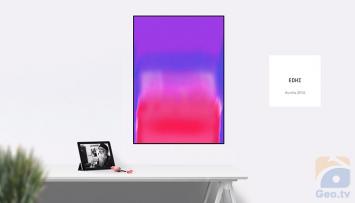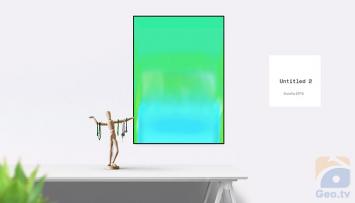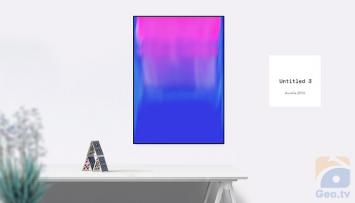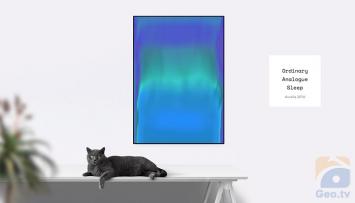Meet 1RIC, the young Pakistani making waves abroad
Developer, Designer, Digital Artist Asad Jamal Malik from Pakistan is not just making waves but as 1RIC he is creating art, using his own brain waves.
August 17, 2016
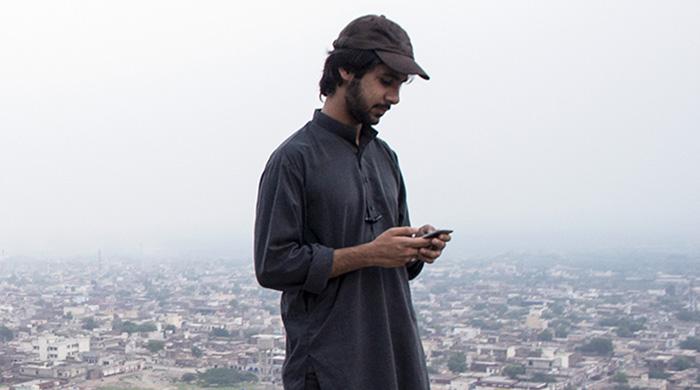
It is always an exciting feeling to see Pakistanis excel at international platforms, showcasing the talent seeping through the country and making it proud. Stories of such individuals are what we draw inspiration from, and in times when Pakistan is in the news for the wrong reasons and there is nothing to do but despair, such stories give people hope and remind them that hard work and determination will get you results no matter where you are from. This is just such a story of a 20 year old Pakistani, going by the pseudonym 1RIC, but known as Asad Jamal Malik to his friends and family.
Born in Abbottabad, and having spent most of his life living in Khewra, Asad discovered the internet at the age of 12 and responded by creating his very own website. Having never left the country, his website provided him access beyond the borders of Pakistan, while positive responses from people on the internet boosted his confidence and encouraged him to keep pursuing his vision. His desire to interact with the international community led him to pursue a scholarship, which he was awarded at the age of 16, allowing him to study in the Netherlands. Instead of taking his time to benefit only himself, Asad chose to become a part of the community and became involved in various projects, such as joining the TEDx program and getting involved in a project known as Project Unify. Talking to us about Project Unify, Asad described it as a web based peace initiative consisting of people from all over the world writing to remove misconceptions about their country. His involvement with TEDx led him to travel to Libya last year, where he gave a talk on ‘Teenage optimism.’
His arrival there coincided with the Libyan Civil War, but instead of leaving in midst of the turmoil and instability, Asad decided to stay on and spent the next two months working with the best architect of the country to set up Libya’s first Human Centered Design Academy. Taking a year off after school to work for his company and on an app called “Noema”, Asad now lives in Vermont, US where he studies on a scholarship at Bennington College, a liberal arts school.
1RIC creates Aurelia
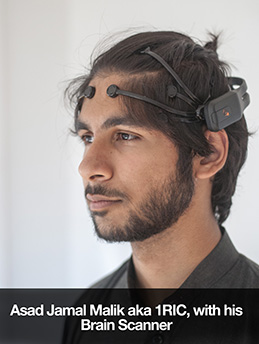 What drew our attention to Asad is his latest project Aurelia, which can be found on his website, titled 1RIC. Explaining the meaning behind the title, Asad says, “1RIC is my pseudonym and that’s what I want to be known as on the Internet. I actually took 1RIC from the English word oneiric, which means relating to a dream or dreaming. Under 1RIC I want to be working on artistic projects related to brain computer interfacing and Aurelia is the first one.” Aurelia, a unique art project describing his emotional state via scans of his brain, is the result of combining Asad’s technological interest with his artistic abilities. He uses a brain scanner to map the activity in his brain, taking note of his emotional state and facial movements. He then wrote software that studied this data and amalgamated it into images, in order to ignite feelings of empathy and an understanding of his emotional state in the audience.
What drew our attention to Asad is his latest project Aurelia, which can be found on his website, titled 1RIC. Explaining the meaning behind the title, Asad says, “1RIC is my pseudonym and that’s what I want to be known as on the Internet. I actually took 1RIC from the English word oneiric, which means relating to a dream or dreaming. Under 1RIC I want to be working on artistic projects related to brain computer interfacing and Aurelia is the first one.” Aurelia, a unique art project describing his emotional state via scans of his brain, is the result of combining Asad’s technological interest with his artistic abilities. He uses a brain scanner to map the activity in his brain, taking note of his emotional state and facial movements. He then wrote software that studied this data and amalgamated it into images, in order to ignite feelings of empathy and an understanding of his emotional state in the audience.
In a conversation with Geo.tv, Asad described the inspiration behind Aurelia: “With Aurelia I wanted to attempt to create images that would portray something directly from my brain. Over the years there have been expressionist painters like Mark Rothko, who would use abstract colour and form to convey strong emotions. You would know the thoughts and emotions translated because very frequently viewers of his paintings would start crying and describe it as an almost spiritual experience.”
What intrigues Asad is the communication of feelings from his brain to a paintbrush that creates an image, allowing people to view his emotions as an art form. “For me eliminating that paint brush is more interesting, the direct communication of one mind to another. That’s the concept that I have worked with on Aurelia.”
When asked how he gets access to the kind of resources needed for a project such as this one, he responds, “I have a brain scanner. I just invest in these kinds of things. I participated in a state wide Hackathon, we won and received $2000 for it and I used it to buy a brain scanner and now I am working with it.”
Speaking of projects he would like to dabble with in the future, he states, “Right now what I am trying to focus on are two things: Augmented Reality and Brain Computer Interfacing, and I am trying to look at both of them from a design and art perspective. What I would like to work on is: what are the future platforms for computing? Today smart phones are a platform that is more user-friendly, but the next computing platforms, at least in my opinion, are augmented reality. Where we are not limited to screens and small flat surfaces, hence that side is very interesting and I definitely want to be exploring that.”
What keeps Asad so motivated at such a young age, you wonder? His passion for knowledge and his inquisitive mind, “My long term goal is to know everything in the universe. I am just really interested in technology. The major thing that differentiates humans from animals is technology. We are constantly evolving technologically and you have to frequently sit down and ask questions like where is technology taking us? Since it’s moving very quickly. The best we can do is influence the path that it takes. The reason why I want to know everything is because I want to influence the path that it leads us to.”
It’s inspiring to see a young Pakistani creator in a world where the internet has become a necessity. His message to people who want be creators and exploit the wonders of the internet? “People need to realize that the barrier to create is very low these days.” Given that the internet provides everyone an equal platform to give their two cents and launch projects of their own, we can only hope that more people follow Asad and get on board the technology train. Here’s wishing Asad the very best of luck for his upcoming endeavors.
Interview and story by Iqra Khan and Maznah Shehzad for Geo.tv
